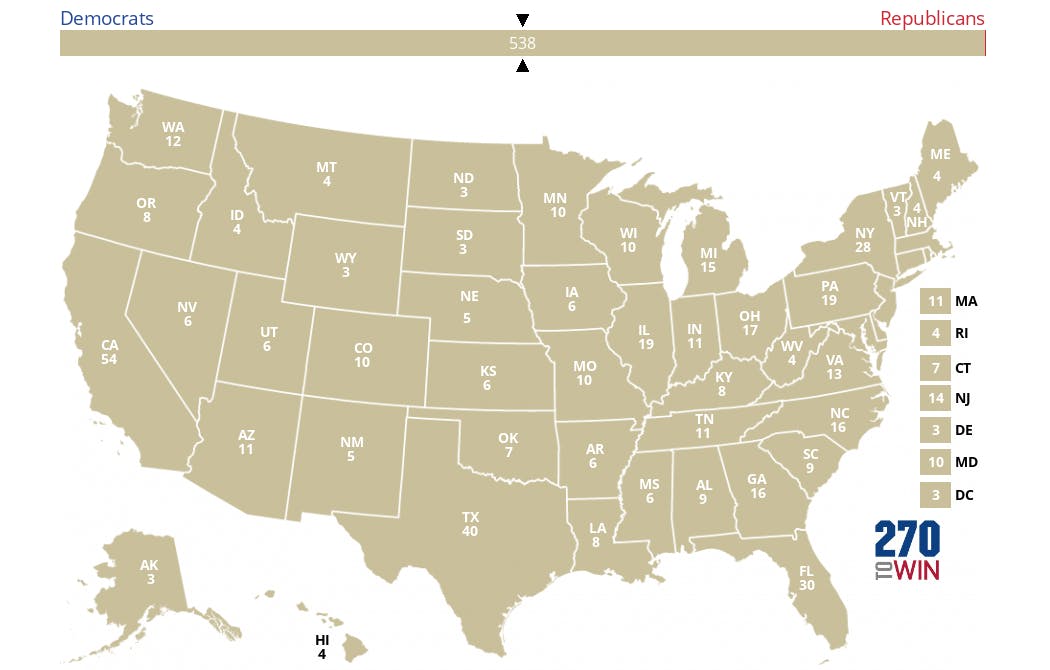Electoral College
I will send out some handy tips and useful exercises for adults learning to navigate and use the English language each week. Please feel free to share this newsletter with friends and colleagues.
The U.S. Presidential elections are getting close and the results could impact people all over the world, so for the next few weeks, we will explore some unique qualities of the American election process. Today, we will look at the electoral college system.
Reading Tip
Language Level – B2
The United States may appear as the leader of democracy around the world, but politicians are human beings and human beings are not perfect. Politicians will go to great lengths to find ways to tip the scales their way, so they can win an election.
Each state decides how they will choose the electors to represent the votes from their state. So the process can vary.
Recently, some states are trying to change how they choose the electors for their electoral college. Below is an article about one such attempt in Nebraska:
https://www.msn.com/en-us/news/politics/nebraska-republican-torches-party-s-hopes-for-extra-electoral-vote/ar-AA1r4uxr?ocid=BingNewsSerp
Listening Tip
Language Level – B1
Watch this brief video that explains what the electoral college is and how it functions in U.S. Presidential elections.

Grammar Tip
Language Level – A2
Phrasal Verbs – multi-word verbs (or compund verb) made up of a main verb and at least one preposition or a particle that changes the meaning of the verb from the original verb.
Examples:
to break (main infinitive verb) – the meaning changes when we add a preposition or particle (or both), creating a phrasal verb.
- to break in
- to break out
- to break down
- to break out of
- to break into
It seems simple, but it can get complicated with real-life examples:
- Damn your principles! Stick to your party. (Prime Minister Benjamin Disraeli)
- When people find out you’re an actress, they Google you. (Actress Laverne Cox)
- Meditation helps me to calm down. (Singer Lady Gaga)
- Do I exaggerate? Boy, do I, and I’d do it more if I could get away with it. (Comedian David Sedaris)
Particle or a Preposition?
Prepositions link nearby words to show how they relate to each other. There are over 100 prepositions, but some of the most common are:
- in
- at
- on
- by
- above
- below
- around
- down
- from
A particle can often be mistaken for an adverb, but it doesn’t add to the description of a verb (which is what an adverb does), it actually changes the meaning of the verb, making it a particle.
When the accompanying word introduces a prepositional phrase, it is classified as a preposition. If it does not, it is classified as a particle. For example:
- She takes after her mother.
(In this example, the prepositional phrase is after her mother. The word after is a preposition.)
(In this example, the word over does not introduce a prepositional phrase. Therefore, it is a particle as opposed to a preposition.)
- I can stand in for you next week.
(In this example, the word in is a particle but the word for is a preposition as it introduces the prepositional phrase for you.)
Let’s Practice!
Identify the phrasal verbs in each sentence below AND determine if they use a preposition or a particle.
- I have all the information that you need but I’m busy. Can I get back to you in half an hour?
- The Prime Minister has decided to step down after 10 years in office.
- We heard the bomb go off from the hotel where we checked in.
- Large companies sometimes take over smaller ones.
- My brother and I get along very well most of the time, but occasionally we do have a fight.
- I gave up playing football a long time ago because of a knee injury.
- Don’t worry, we’ll try to find out the problems and find a solution for everyone.
Vocabulary Tip
Language Level – B2
We continue to add to our vocabulary words from the Oxford 3000.
A list of 3000 words someone should know if they are taking the CEFR (Common European Framework Reference) language tests.
- Crisis (n)
- Criterion (n)
- Critic (n)
- Critical (adj)
- Criticism (n)
- Criticize (v)
- Crop (n)
- Crucial (adj)
- Cry (n)
- Cure (v, n)
Study these words with this quizlet.
Each week new words are added to the same quizlet, so all of the B2 level words will be in one list for practice.
Weekly Challenge
Language Level – B1
Let’s review some mixed conditionals. Fill in the blank with the correct verb form in each sentence below:
- If I didn’t know you well, I___________ word you said yesterday. (not believe)
- If I were more responsible, I_________that project before the deadline. (complete)
- If I____________that concert last Sunday, we wouldn’t be enjoying it now. (not record)
- I______________to France next week if I had booked tickets two weeks before. (go)
- Dan ______________in this concert if he had practiced playing the violin more. (participate)
- Stella would have visited you yesterday if she____________________in the hospital. (not be)
- If the children__________so much ice cream, they wouldn’t have sore throats now. (not eat)
- Tommy____________there by train last week if he knew how to drive a car. (not go)
- If we hadn’t lost so much money last year, we________________a new house. (buy)
Questions?

